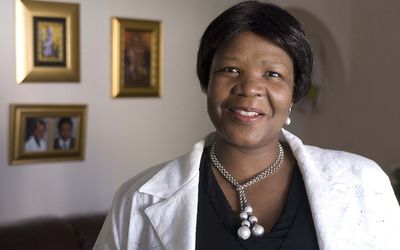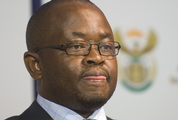Mentor just one of ANC’s inconvenient women
by Lindiwe Mazibuko,
2016-03-17 05:58:34.0
I REMEMBER Vytjie Mentor. Very well, in fact, and I was not even a member of her caucus. I remember her as a vibrant, high-profile and infuriating colleague in the National Assembly. I remember how, in 2010, Democratic Alliance (DA) MP Pieter van Dalen exposed Eskom scandal after Eskom scandal, making her life fairly miserable in the portfolio committee on public enterprises that she chaired very publicly and controversially.
I am almost struck dumb by the callousness of President Jacob Zuma’s public statement, denying knowledge of the very existence of a woman who was also chairwoman of the African National Congress (ANC) caucus in Parliament; a woman who loomed so large in his own party as to have a memorable effect on ours.
Why go so far as to attempt to expunge her from history when a cursory Google search reveals not only her political bona fides, but also her ties to the president himself? Why not simply dispute her version of the Saxonwold meeting in question?
The resignation of ANC chief whip Stone Sizani was a salty reminder of how many political careers in the ANC have been sacrificed at the altar of Zuma’s excess.
But this latest treatment of Mentor cuts deeply because it also brings to mind the legions of women in the ANC who have become forgotten collateral damage in the construction of Zuma’s empire.
I care very little about the insinuation that there may have been something more between Mentor and the president, as some have suggested on social media.
It is the treatment of women as little more than distractions to be dehumanised and denied by the powerful and rapacious that sets my blood on a rolling boil.
I remember you, Vytjie, and the countless inconvenient women in the ANC who have been used as canon fodder in the senseless battle to keep the president in power at all costs.
I remember Dipuo Peters, who would not be a shill for a flawed nuclear power deal, and Barbara Hogan, whose only crime was trying to build clean and functional public enterprises that delivered on their mandate.
I remember Gwen Mahlangu-Nkabinde, one of the first public works ministers to be impaled upon the Nkandla scandal.
I remember Doris Dlakude, Mmamoloko Kubayi and the long line of women who invested their own political capital in defending the president’s actions in Parliament, only to be hung out to dry in the Constitutional Court.
Perhaps the time has finally come for the governing party to heed the words of Hogan, who has urged members "to start looking very carefully and introspectively … about our roles in this organisation and what we are giving consent to by allowing this president to operate as though he is completely unaccountable".
How many more ANC MPs have been offered Cabinet posts improperly by SA’s unelected First Family in exchange for government tenders and shady kickbacks?
Good men and women in the ANC can still stand up and arrest the decline before it is too late.
The only cure for this infestation is the light of public scrutiny.
The words "state" and "capture" have been bandied about a great deal since the departure of the finance minister, Nhlanhla Nene, in December — sometimes relevantly and sometimes not.
Analysts have also compared the ludicrous attentions paid by the Hawks to Pravin Gordhan — the only person who seems to be working tirelessly to pull SA back from the economic precipice — to their complete lack of interest in so much as turning their gaze towards allegations about the machinations of the Gupta family.
The remedy, however, lies not with the Hawks, but with the National Assembly.
It is Parliament that has the authority and the responsibility to investigate allegations of wrongdoing on the part of the head of state.
It has powers, both statutory and constitutional, and it has resources, both financial and institutional.
All that remains is for the political will across party lines to put a decisive end to this madness.
While every round of failed motions of no confidence and impeachment processes may dishearten some, we should remember that Parliament is exercising and refining the institutional muscle necessary to hold any errant head of state accountable for his actions.
This can only make the task easier and more straightforward when the time comes to do just that.
• Mazibuko, a former parliamentary leader of the Democratic Alliance, is a resident fellow of the Harvard Institute of Politics

Vytjie Mentor. Picture: TREVOR SAMSON
I REMEMBER Vytjie Mentor. Very well, in fact, and I was not even a member of her caucus. I remember her as a vibrant, high-profile and infuriating colleague in the National Assembly. I remember how, in 2010, Democratic Alliance (DA) MP Pieter van Dalen exposed Eskom scandal after Eskom scandal, making her life fairly miserable in the portfolio committee on public enterprises that she chaired very publicly and controversially.
I am almost struck dumb by the callousness of President Jacob Zuma’s public statement, denying knowledge of the very existence of a woman who was also chairwoman of the African National Congress (ANC) caucus in Parliament; a woman who loomed so large in his own party as to have a memorable effect on ours.
Why go so far as to attempt to expunge her from history when a cursory Google search reveals not only her political bona fides, but also her ties to the president himself? Why not simply dispute her version of the Saxonwold meeting in question?
The resignation of ANC chief whip Stone Sizani was a salty reminder of how many political careers in the ANC have been sacrificed at the altar of Zuma’s excess.
But this latest treatment of Mentor cuts deeply because it also brings to mind the legions of women in the ANC who have become forgotten collateral damage in the construction of Zuma’s empire.
I care very little about the insinuation that there may have been something more between Mentor and the president, as some have suggested on social media.
It is the treatment of women as little more than distractions to be dehumanised and denied by the powerful and rapacious that sets my blood on a rolling boil.
I remember you, Vytjie, and the countless inconvenient women in the ANC who have been used as canon fodder in the senseless battle to keep the president in power at all costs.
I remember Dipuo Peters, who would not be a shill for a flawed nuclear power deal, and Barbara Hogan, whose only crime was trying to build clean and functional public enterprises that delivered on their mandate.
I remember Gwen Mahlangu-Nkabinde, one of the first public works ministers to be impaled upon the Nkandla scandal.
I remember Doris Dlakude, Mmamoloko Kubayi and the long line of women who invested their own political capital in defending the president’s actions in Parliament, only to be hung out to dry in the Constitutional Court.
Perhaps the time has finally come for the governing party to heed the words of Hogan, who has urged members "to start looking very carefully and introspectively … about our roles in this organisation and what we are giving consent to by allowing this president to operate as though he is completely unaccountable".
How many more ANC MPs have been offered Cabinet posts improperly by SA’s unelected First Family in exchange for government tenders and shady kickbacks?
Good men and women in the ANC can still stand up and arrest the decline before it is too late.
The only cure for this infestation is the light of public scrutiny.
The words "state" and "capture" have been bandied about a great deal since the departure of the finance minister, Nhlanhla Nene, in December — sometimes relevantly and sometimes not.
Analysts have also compared the ludicrous attentions paid by the Hawks to Pravin Gordhan — the only person who seems to be working tirelessly to pull SA back from the economic precipice — to their complete lack of interest in so much as turning their gaze towards allegations about the machinations of the Gupta family.
The remedy, however, lies not with the Hawks, but with the National Assembly.
It is Parliament that has the authority and the responsibility to investigate allegations of wrongdoing on the part of the head of state.
It has powers, both statutory and constitutional, and it has resources, both financial and institutional.
All that remains is for the political will across party lines to put a decisive end to this madness.
While every round of failed motions of no confidence and impeachment processes may dishearten some, we should remember that Parliament is exercising and refining the institutional muscle necessary to hold any errant head of state accountable for his actions.
This can only make the task easier and more straightforward when the time comes to do just that.
• Mazibuko, a former parliamentary leader of the Democratic Alliance, is a resident fellow of the Harvard Institute of Politics




















Change: 1.19%
Change: 1.36%
Change: 2.19%
Change: 1.49%
Change: -0.77%
Data supplied by Profile Data
Change: -0.19%
Change: 0.69%
Change: 1.19%
Change: 0.00%
Change: 0.44%
Data supplied by Profile Data
Change: 0.06%
Change: 0.25%
Change: 0.50%
Change: 0.51%
Change: 0.00%
Data supplied by Profile Data
Change: -0.28%
Change: -0.41%
Change: 0.13%
Change: 0.00%
Change: -0.41%
Data supplied by Profile Data